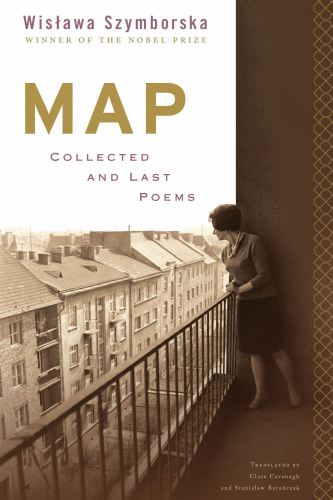
Map
Collected and Last Poems
- اطلاعات
- نقد و بررسی
- دیدگاه کاربران
نقد و بررسی

Starred review from March 16, 2015
Szymborska (1923–2012), winner of the 1996 Nobel Prize in Literature, has her vast and impressive poetic repertoire on full display in this posthumously published volume. Ordered chronologically, the book reveals her development over seven decades, including a gradual departure from end rhyme and the sharpening of her wit. As multitudinous as Whitman, she conveyed deep feeling through vivid, surreal imagery and could revive clichéd language by reconnecting it to the body in startling ways: “Listen,/ how your heart pounds inside me.” To say that Szymborska wore many hats as a poet is an understatement: odes, critiques, and persona poems are just a few of the forms her writing took. Yet, despite their diversity, the constants of her poems were nuance and observational humor: “Four billion people on this earth,/ but my imagination is still the same.” Also apparent is Szymborska’s rare ability to present an epiphany in a single line, and her bravery in writing toward death: “But time is short. I write.” Ever the student, she obsessively explored the histories and processes of writing, never far from penning another Ars Poetica. “Everything here is small, near, accessible,” Szymborska writes in the title poem—a maxim about the way the reader feels within her lines.

Starred review from March 15, 2015
Nobel laureate Szymborska's gorgeous posthumous collection, translated and edited by her confidant, Cavanagh, with Baranczak, includes more than 250 poems, selected from 13 books, dating back to 1952, as well as previously unreleased poems from as far back as 1944. This revered Polish poet, who came to fame well after the poet Charles Simic first handed her work to an editor, interweaves insights into the suffering experienced during WWII and the Cold War brutalities of Stalin with catchy, realistic, colloquial musings on obvious and overlooked aspects of survival. Her poems are revelatory yet rooted in the everyday. She writes about living with horrors, and about ordinary lives: people in love, at work, enjoying a meal. Throughout, Szymborska considers loss and fragility, as when former lovers walk past each other and an aging professor is no longer allowed his vodka and cigarettes. She writes, too, of the imprecision of memory, and in the title poem, the discovery that maps give no access to the vicious truth. This is a brilliant and important collection.(Reprinted with permission of Booklist, copyright 2015, American Library Association.)




دیدگاه کاربران